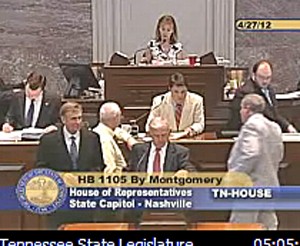
Though the Tennessee General Assembly was still grinding away at last-minute matters on Friday afternoon and was destined to work over the weekend and on Monday to complete this year’s budget and other matters, the two bills affecting school districts for Shelby County’s suburban municipalities finally got legislative imprimatur.
Just before 5 o’clock on Friday, the House easily approved a conference committee report on HB1105/SB1923, the education bill on which Senate Majority Leader Mark Norris (R-Collierville) had grafted an enabling amendment for the suburbs to hold referenda on municipal districts this year.
Thus was concluded a drama that resulted from state Attorney General Robert Cooper’s opinion last month that referenda which had been scheduled for May by Germantown, Collierville, Bartlett, Lakeland, and Arlington would be unconstitutional . Cooper’s reasoning was that no such steps could be taken until August 2013, the date specified by last year’s Norris-Todd bill. Subsequently the Shelby County Election Commission canceled the May referenda.
Norris then submitted one bill, SB2908/HB3234, that would have moved up the date of eligibility for municipal school Districts to January 1, 2013 and offered an amendment to HB1105/SB1923, an unrelated measure concerning the evaluation of school directors, that explicitly would have permitted the suburbs to hold referenda, presumably in August, and then to establish the machinery for school boards.
Both the new Norris bill and the amendment were written so as to apply statewide. This would seem to have been a precaution taken by Norris in the wake of an earlier Cooper opinion that a piece of Norris legislation affecting annexation procedures in Shelby County alone was unconstitutional and had to be withdrawn. Cooper had noted that the bill’s effect was limited to one county without having the unanimous consent of that county’s delegation, and thus could not qualify as a private bill.
But the two new Norris initiatives, cast as general bills with provisions seeming to enable new school districts everywhere, aroused alarms even among previously compliant GOP legislators elsewhere in the state. Ultimately, SB2908/HB3234 was amended to a shadow of its previous self, merely repeating language already appearing in Norris-Todd concerning the eligibility of municipal districts in Shelby County as of August 2013, when merger of Memphis City Schools and Shelby County Schools is due to be completed.
And Norris’ amendment to HB1105/SB1923, which had failed of acceptance twice in the House because it, too, seemed clearly to have statewide application, was revised in a House/Senate conference committee this week so as to apply only to counties where transition committees were monitoring school mergers — a definition that essentially fit only Shelby County. In that circuitous form the amendment was made acceptable to the full House, which accepted the bill as so amended and passed the measure 61-25.
Almost certainly the new legislation will be subjected to legal challenge of one sort or another. And so will other aspects relating to the establishment of municipal school districts — notably the issue of whether such districts are entitled to enroll (and receive state and federal funding for) students residing outside their borders, as well as the vexing issue of potential costs for the suburban municipalities in acquiring existing school property.